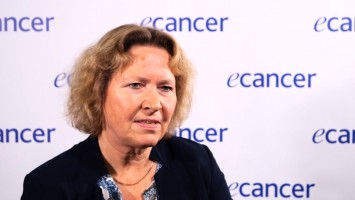I’ll be presenting the results of the KEYNOTE-942 trial at this year’s ASCO 2023. This is a randomised phase II study which was designed to look at an individualised neoantigen therapy approach with an mRNA vaccine designed by Moderna in combination with pembrolizumab, compared to pembrolizumab monotherapy in patients with high risk resected melanoma.
The rationale for doing this study was that we were trying to find out if doublet treatment works better than single agent because there is still a significant number of patients who will experience disease relapse despite curative intent surgery as well as effective adjuvant treatment options. These patients have local relapse as well as distant relapse so there is unmet need.
Number two, the concept of a personalised cancer vaccine is very appealing. So rather than giving a very one-size-fits-all approach to treating everybody with the same drug, what we tried to do in this study was to take a more personalised approach for an individual patient’s unique tumour mutations. So the mRNA vaccine is designed specifically for an individual patient’s unique tumour mutations and that is then encoded onto an mRNA vaccine and then given to the patient.
The design of the study included about 157 patients with high-risk resected stage 3b, c, d or resected stage 4 melanoma who have undergone surgery within 13 weeks of starting treatment with pembrolizumab. These patients were randomised in a 2:1 manner, so 107 patients received combination treatment with the mRNA vaccine plus pembrolizumab and 50 patients received pembrolizumab monotherapy. The primary endpoint of the trial was relapse free survival and then distant metastasis free survival was hierarchically tested in the context of a positive primary endpoint of relapse free survival. We followed these patients roughly for a median of about two years.
The study met its primary endpoint of improvement in relapse free survival with the combination treatment with a hazard ratio of 0.56 which means a 44% relative risk reduction in local relapse. At an 18-month time point there was roughly about a 16% absolute improvement in relapse free survival.
The results that I’m presenting in this meeting were the distant metastasis free survival because distant metastasis free survival is an important endpoint because patients who relapse distantly got a poorer outcome with high mortality and morbidity. With these patients the distant metastasis free survival was also improved by the combination treatment. The hazard ratio was quite strong, 0.34 – a 65% relative risk reduction which translated to about a 15% improvement in distant metastasis free survival at the 18-month time point. These results confirm that both the primary and secondary endpoints were met with a clinically significant improvement.
More importantly, we didn’t see any other strong safety signals in terms of pembrolizumab, which is the current standard of care. More importantly, we didn’t see any significant side effects associated with the vaccine. So the risk of grade 3 or higher adverse events which lead to major morbidity were about 10% with the vaccine. Most of those vaccine-related adverse events were grade 1 or 2, meaning that they were fairly easy to manage and self-limiting. They lasted for about 24-48 hours. The common side effects included fever, chills, body aches and injection site reaction or redness. These are common side effects that we see with a lot of mRNA COVID vaccines. So overall the treatment was fairly well tolerated and there was no significant difference seen between the two groups in terms of immune mediated adverse events as well.
So, to summarise, the combination of the mRNA vaccine with pembrolizumab demonstrated a clinically significant improvement in relapse free survival and distant metastasis free survival without compromising the toxicity profile of either of the drugs or in combination.
So, moving forward, because this is a phase II study, a randomised phase III study is planned in collaboration between Merck and Moderna. That study is going to be rolled out in the next few months across the world. We think if that study becomes positive that might be potentially practice changing.








